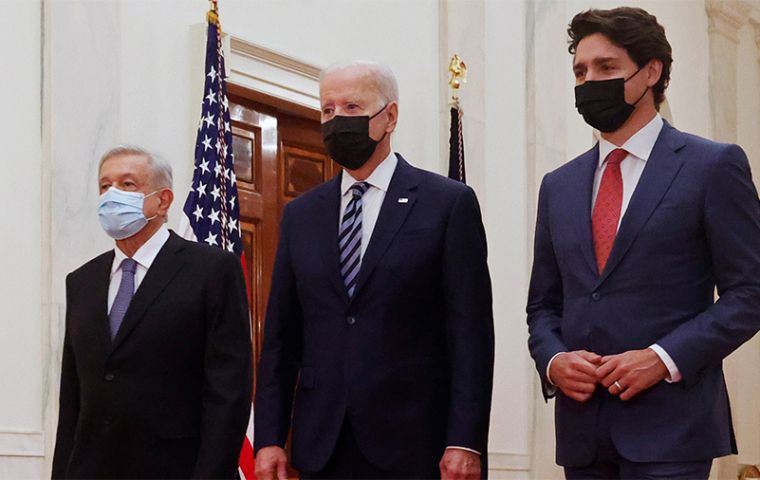MercoPress. South Atlantic News Agency
Wishful declarations after three-leader Summit in Washington
 It was the first “Three Amigos” meeting in five years, following distancing under Trump
It was the first “Three Amigos” meeting in five years, following distancing under Trump Leaders of Canada, the United States and Mexico have achieved little to no progress after their first three-part Summit in Washington this week. Nevertheless, there were some coincidences regarding arms trafficking, migration and the recovery from the pandemic.
The leaders hailed their “Three Amigos” partnership during their first summit in five years, but tensions over trade and immigration failed to move past rhetorical declarations.
“We are experiencing a public health epidemic of gun violence, in part due to the diversion of firearms to illegal markets. For example, hundreds of thousands of firearms cross into Mexico annually, empowering transnational criminal organizations and generating irreversible damage to society,” the post-conference joint statements from Presidents Andrés Manuel López Obrador and Joseph Biden as well as Prime Minister Justin Trudeau read.
The three countries also pledged to continue addressing these issues through dialogue during 2022.
Regarding migration, the United States made a commitment to invest in a program called “Sembrando Oportunidades,” in response to the Mexican “Sowing life” strategy, whereby the Biden administration acknowledges the need to contain undocumented flows from Central America to the United States, by tackling the causes of this exodus, such as poverty, injustice, insecurity and unemployment.
According to Mexican Foreign Minister Marcelo Ebrard, the program will seek to promote regular migration routes through labor mobility programs, especially in the agricultural sector, including the intention to cooperate in the development of dialogue to share expansion plans, best practices and lessons learned from the temporary worker visa programs.
The scourge of the COVID-19 pandemic was also addressed. The three leaders pledged to work to develop vaccines against the coronavirus and to donate the antidote to Caribbean countries and other nations in the region so that those populations too could be jabbed.
Before the trilateral meeting President López Obrador had individual meetings with Biden and Trudeau where it was agreed to “move towards a more inclusive economic integration, in which youth, women and indigenous communities benefit from greater commercial cooperation” with the United States-Mexico-Canada agreement.
The meeting in Washington, DC on Thursday was the first of its kind since 2016, after being discontinued when Donald Trump took over as president.
“Together as North America we stand strong, and look to better build back our communities, our infrastructure, and our shared future as integrated partners,” the joint statement also read. They agreed to meet again next year, this time in Mexico.
Biden has sought to resume strong relations with Canada and Mexico as part of his new approach at international events.
The three countries are bound by the US-Mexico-Canada (USMCA/TMEC) free trade agreement, which governs some US $ 1.5 trillion a year in North American trade.
After the meeting, Biden was confident the challenges facing the three countries could be addressed “if we just take the time to speak with one another, by working together.”
Trudeau touted the “extremely strong ties” between the three countries, while Lopez Obrador hailed Biden’s re-engagement, saying “our relations must always be based on respect.”
The positive statements yielded few breakthroughs on several topics left unsolved from the Donald Trump years, during which the former President had threatened to abandon the alliance and imposed tariffs on Canadian aluminium and steel. He also declared a national emergency on the Mexican border and used xenophobic language about undocumented migrants, although he ultimately came to a good understanding with López Obrador.
Canada and Mexico still see remnants of Trump’s “America First” policies and have voiced their concern over a Biden proposal for a tax credit encouraging US production of electric vehicles. Cars and trucks are the most-traded manufactured product between the three countries
Trudeau insisted Ottawa would “continue to do the work necessary to not just highlight our position but find solutions” after the summit did not yield any shifts on Biden’s plans.
Another sticking point is Biden’s “Buy American” policy for the federal government in its plans to replace its huge fleet of automobiles, which Canada has called undisguised protectionism.
Nevertheless, the three leaders also agreed to ban imports of goods made with forced labor, which targetted China without mentioning it, although Beijing has always denied allegations in that regard.




Top Comments
Disclaimer & comment rulesCommenting for this story is now closed.
If you have a Facebook account, become a fan and comment on our Facebook Page!